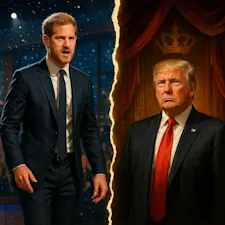
Trump Demands Apology: 'Dumb as a Rock'
Donald Trump speaking with supporters at a campaign rally at Veterans Memorial Coliseum at the Arizona State Fairgrounds in Phoenix, Arizona, 2016. Photo courtesy of Gage Skidmore under CC BY-SA 2.0.
Donald Trump reportedly launched a fierce attack on Kamala Harris, calling her "dumb as a rock" and demanding an apology after she described the 2024 presidential election as the "closest presidential election in the 21st century," as reported by Daily Wire. The former president's sharp rebuke, posted on his Truth Social platform, escalates a high-profile feud that highlights the ongoing political battle over election narratives and legitimacy.
A Social Media Explosion
The clash began after Harris appeared on MSNBC's "The Rachel Maddow Show" to promote her memoir, "107 Days," where she claimed the 2024 race was exceptionally close. Trump responded with a graphic showing election results by county and dismissed her claim as a "total lie," as reported by The Daily Beast. He pointed to his 312-226 Electoral College victory, his wins in all seven battleground states, and a popular vote margin he described as a "landslide," despite falsely alleging California's mail-in ballot process was "rigged" against him, as reported by Daily Wire.
In his post, Trump called Harris "dumb as a rock" and accused her of using the "closest election" claim as a standard excuse for her loss. According to Daily Wire, he emphasized that previous elections, including the 2000 contest decided by just 537 votes in Florida, were closer than 2024. Trump's demand for an apology added a theatrical edge to the dispute, turning a policy disagreement into a personal battle.
Why They Keep Fighting About 2024
At the core of this dispute is a broader debate about election legitimacy and the narratives political figures choose to promote. Harris's assertion that the 2024 election was the closest of the century reflects a messaging strategy that highlights the competitiveness of her campaign, especially given the short timeframe after President Joe Biden's withdrawal from the race. Harris explained she had just over three months to mount a nationwide campaign against a former president who had been running for a decade, framing her loss within a context of structural challenges.
It is important to note that Harris's claim about the 2024 election being the closest in the 21st century lacks publicly provided evidence. Requests for substantiation sent to her office went unanswered, leaving the assertion unverified, as reported by The Daily Beast.
Trump's rebuttal taps into fears about the erosion of trust in electoral outcomes. By labeling Harris's claim a "total lie" and insisting on a landslide victory, he reinforces his narrative of a decisive win and challenges any suggestion that the election was narrowly decided. His reference to California's mail-in ballots as "fake" and "rigged" echoes long-standing claims about election integrity that continue to fuel partisan divisions, though these claims are unsubstantiated, as reported by The Daily Beast.
How Close Was the 2024 Election, Really?
The numbers don't exactly back Harris up.
Why "closest" can mean different things. When politicians talk about how close an election was, they don't always measure it the same way. Some look at the popular vote margin, others at the Electoral College tally, and still others at the tipping-point state that secures 270 electoral votes. By those standards, 2024 was competitive but not the narrowest of the century.
Trump's Electoral College win — 312 to 226 — wasn't the slimmest in recent memory. Of the seven elections held since 2000, it ranks right in the middle. Harris lost the popular vote by about 1.5%, a clear gap compared to the 2000 election, where Al Gore actually won the popular vote by just 0.5% and still lost the presidency. And in terms of so-called "tipping-point" states — the decisive state that pushes a candidate over the Electoral College threshold — Trump had far more breathing room than past winners. In 2024 Trump carried Wisconsin, Michigan, and Pennsylvania by a combined 229,766 votes — far more comfortable than Florida's 537-vote margin in 2000 or the fewer than 43,000 votes across three states that delivered Joe Biden the presidency in 2020.
So, was it close? Depends who you ask. But by the numbers, Harris's claim doesn't hold much water.
What This Means for Voters and the Political Climate
For voters, the Trump-Harris exchange is a reminder of the intense emotions and strategic calculations that define modern political campaigns. The personal intensity of Trump's insults may entertain some and alienate others, but it undeniably raises the stakes in the ongoing debate over election legitimacy.
The fear that election results could be questioned or delegitimized remains a potent force in American politics. Both Trump and Harris are navigating this terrain carefully, using their narratives to solidify support while challenging the other's credibility.
As the political landscape continues to evolve, the lines between critique and insult, fact and rhetoric, will remain contested. This feud is likely just one chapter in a longer story about how elections are fought not only at the ballot box but also in the court of public opinion.
For now, Trump's call for an apology from Harris stands as a bold challenge, underscoring the personal and political stakes involved in defining the 2024 election's legacy.
References: Trump Melts Down Over Kamala Harris' Strange Election Claim | 'I Expect An Apology': Trump Torches 'Dumb As A Rock' Kamala | Donald Trump demands apology from Kamala Harris after she calls 2024 race closest election






















